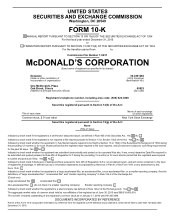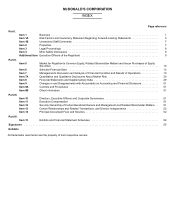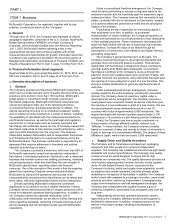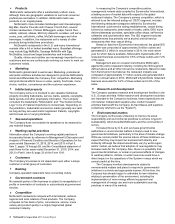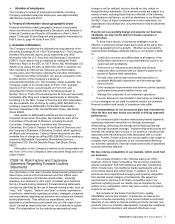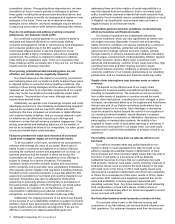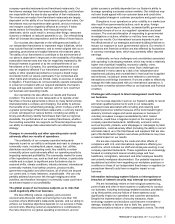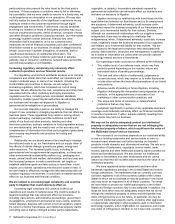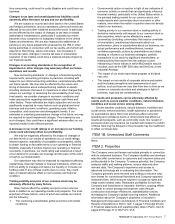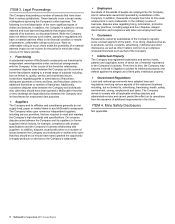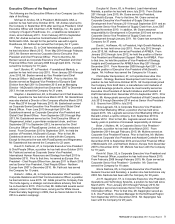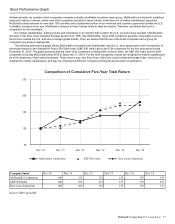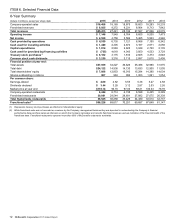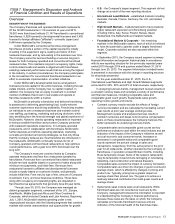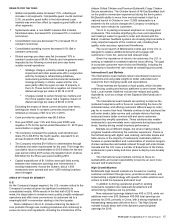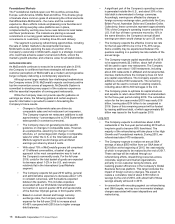McDonalds 2015 Annual Report Download - page 9
Download and view the complete annual report
Please find page 9 of the 2015 McDonalds annual report below. You can navigate through the pages in the report by either clicking on the pages listed below, or by using the keyword search tool below to find specific information within the annual report.
McDonald's Corporation 2015 Annual Report 7
time-consuming, could result in costly litigation and could harm our
business.
Changes in tax laws and unanticipated tax liabilities could
adversely affect the taxes we pay and our profitability.
We are subject to income and other taxes in the United States
and foreign jurisdictions, and our operations, plans and results are
affected by tax and other initiatives around the world. In particular,
we are affected by the impact of changes to tax laws or related
authoritative interpretations, particularly if corporate tax reform
becomes a key component of budgetary initiatives in the United
States and elsewhere. We are also impacted by settlements of
pending or any future adjustments proposed by the IRS or other
taxing authorities in connection with our tax audits, all of which will
depend on their timing, nature and scope. Any increases in
income tax rates, changes in income tax laws or unfavorable
resolution of tax matters could have a material adverse impact on
our financial results.
Changes in accounting standards or the recognition of
impairment or other charges may adversely affect our future
operations and results.
New accounting standards or changes in financial reporting
requirements, accounting principles or practices, including with
respect to our critical accounting estimates, could adversely affect
our future results. We may also be affected by the nature and
timing of decisions about underperforming markets or assets,
including decisions that result in impairment or other charges that
reduce our earnings. In assessing the recoverability of our long-
lived assets, we consider changes in economic conditions and
make assumptions regarding estimated future cash flows and
other factors. These estimates are highly subjective and can be
significantly impacted by many factors such as global and local
business and economic conditions, operating costs, inflation,
competition, and consumer and demographic trends. If our
estimates or underlying assumptions change in the future, we may
be required to record impairment charges. If we experience any
such changes, they could have a significant adverse effect on our
reported results for the affected periods.
A decrease in our credit ratings or an increase in our funding
costs could adversely affect our profitability.
We may be negatively affected by the impact of changes in
our debt levels or our results of operations on our credit ratings,
interest expense, availability of acceptable counterparties, ability
to obtain funding on favorable terms or our operating or financial
flexibility, especially if lenders impose new operating or financial
covenants. In particular, our credit rating was lowered as a result
of our decision to increase our leverage and the pace of the return
of cash to our shareholders.
Our operations may also be impacted by regulations affecting
capital flows, financial markets or financial institutions, which can
limit our ability to manage and deploy our liquidity or increase our
funding costs. If any of these events were to occur, they could
have a material adverse effect on our business and financial
condition.
Trading volatility and price of our common stock may be
adversely affected by many factors.
Many factors affect the volatility and price of our common
stock in addition to our operating results and prospects. The most
important of these factors, some of which are outside our control,
are the following:
The continuing unpredictable global economic and market
conditions;
Governmental action or inaction in light of key indicators of
economic activity or events that can significantly influence
financial markets, particularly in the United States which is
the principal trading market for our common stock, and
media reports and commentary about economic or other
matters, even when the matter in question does not directly
relate to our business;
Trading activity in our common stock or trading activity in
derivative instruments with respect to our common stock or
debt securities, which can be affected by market
commentary (including commentary that may be unreliable
or incomplete); unauthorized disclosures about our
performance, plans or expectations about our business; our
actual performance and creditworthiness; investor
confidence generally; actions by shareholders and others
seeking to influence our business strategies; portfolio
transactions in our stock by significant shareholders; or
trading activity that results from the ordinary course
rebalancing of stock indices in which McDonald’s may be
included, such as the S&P 500 Index and the Dow Jones
Industrial Average;
The impact of our stock repurchase program or dividend
rate; and
The impact on our results of corporate actions and market
and third-party perceptions and assessments of such
actions, such as those we may take from time to time as we
review our corporate structure and strategies in light of
business, legal and tax considerations.
Our results and prospects can be adversely affected by
events such as severe weather conditions, natural disasters,
hostilities and social unrest, among others.
Severe weather conditions, natural disasters, hostilities and
social unrest, terrorist activities, health epidemics or pandemics
(or expectations about them) can adversely affect consumer
spending and confidence levels or other factors that affect our
results and prospects, such as commodity costs. Our receipt of
proceeds under any insurance we maintain with respect to certain
of these risks may be delayed or the proceeds may be insufficient
to offset our losses fully.
ITEM 1B. Unresolved Staff Comments
None.
ITEM 2. Properties
The Company owns and leases real estate primarily in connection
with its restaurant business. The Company identifies and develops
sites that offer convenience to customers and long-term sales and
profit potential to the Company. To assess potential, the Company
analyzes traffic and walking patterns, census data and other
relevant data. The Company’s experience and access to
advanced technology aid in evaluating this information. The
Company generally owns the land and building or secures long-
term leases for conventional franchised and Company-operated
restaurant sites, which ensures long-term occupancy rights and
helps control related costs. Restaurant profitability for both the
Company and franchisees is important; therefore, ongoing efforts
are made to control average development costs through
construction and design efficiencies, standardization and by
leveraging the Company’s global sourcing network. Additional
information about the Company’s properties is included in
Management’s Discussion and Analysis of Financial Condition and
Results of Operations in Part II, Item 7, pages 13 through 29 and
in Financial statements and supplementary data in Part II, Item 8,
pages 29 through 47 of this Form 10-K.

